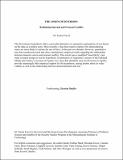The Limits of Diversion: Rethinking Internal and External Conflict
Author(s)
Fravel, Maris Taylor
DownloadFravel_The Limits.pdf (368.2Kb)
OPEN_ACCESS_POLICY
Open Access Policy
Creative Commons Attribution-Noncommercial-Share Alike
Terms of use
Metadata
Show full item recordAbstract
The diversionary hypothesis offers a powerful alternative to rationalist explanations of war based on the state as a unitary actor. Most recently, it has been used to explain why democratizing states are more likely to initiate the use of force. In the past two decades, however, quantitative tests have produced mixed and often contradictory empirical results regarding the relationship between domestic unrest and external conflict. This article uses a modified “most likely” case study research design to test the hypothesis. Examination of Argentina's seizure of the Falkland Islands and Turkey's invasion of Cyprus, two cases that should be easy for diversion to explain, provide surprisingly little empirical support for the hypothesis, raising doubts about its wider validity as well as the relationship between democratization and war.
Date issued
2010-05Department
Massachusetts Institute of Technology. Department of Political Science; Massachusetts Institute of Technology. Security Studies ProgramJournal
Security Studies
Publisher
Taylor & Francis Group, LLC
Citation
Fravel, M. Taylor. "The Limits of Diversion: Rethinking Internal and External Conflict" Security Studies 19.2 (2010). 26 Oct. 2010 © Taylor & Francis Group, LLC.
Version: Author's final manuscript
ISSN
0963-6412
1556-1852